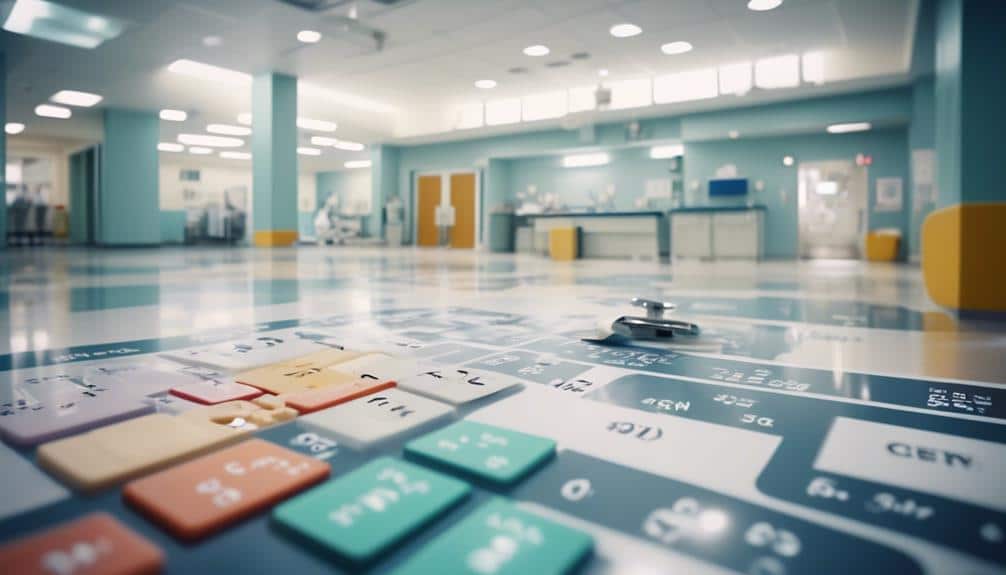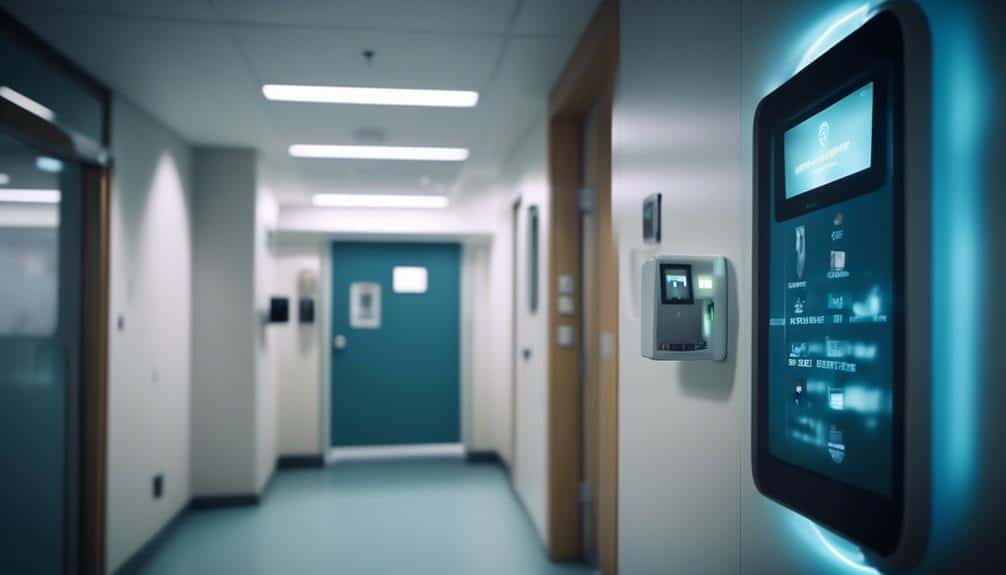In the intricate maze of hospital corridors, finding the best key system is like discovering the perfect key that unlocks all doors with ease.
As professionals, we understand the importance of a secure and efficient key system that ensures the safety of patients, staff, and sensitive information.
But with numerous options available, how do we navigate this complex terrain and choose the key system that truly fits our hospital's needs?
Join us as we explore the benefits, factors to consider, key features, and successful case studies of implementing a master key system in hospitals.
So, let's unlock the door to a discussion that could hold the key to revolutionizing hospital security.
Benefits of a Master Key System for Hospitals

Implementing a master key system in hospitals offers a multitude of benefits, making it a crucial security measure for ensuring efficient access control and safeguarding sensitive areas.
One of the key advantages of a master key system is the ability to streamline access control processes. With a master key, authorized personnel can easily access multiple areas within the hospital, eliminating the need for carrying multiple keys or seeking permission from different departments. This not only saves time but also improves overall efficiency in emergency situations.
Additionally, a master key system enhances security measures by providing strict control over who has access to specific areas. By assigning different levels of access to different individuals, hospitals can ensure that only authorized personnel can enter sensitive areas such as operating rooms, laboratories, or medication storage rooms. This reduces the risk of unauthorized access, theft, or tampering with critical equipment or medications.
Moreover, by implementing a master key system, hospitals can easily manage key distribution and control. The system allows for key tracking, ensuring accountability and minimizing the risk of lost or stolen keys. In the event of a security breach or staff turnover, the master key system allows for quick and efficient rekeying without the need to replace all individual locks, saving time and resources.
Factors to Consider When Choosing a Key System for Hospitals

When selecting a key system for hospitals, several factors should be carefully considered to ensure optimal security and efficient access control. Two critical factors are cost considerations and security requirements.
Cost considerations play a significant role in the decision-making process. Hospitals operate on tight budgets and need to allocate their resources wisely. It is essential to assess the initial costs of implementing a key system, including the cost of hardware, installation, and any necessary modifications to existing doors or locks. Additionally, ongoing maintenance and potential future upgrades should be taken into account. Balancing the overall cost with the desired level of security is crucial to make a cost-effective choice.
Security requirements are paramount in a hospital setting. Hospitals house sensitive patient information, valuable medical equipment, and controlled substances, making them attractive targets for theft or unauthorized access. A key system should provide robust security features such as high-quality locks, restricted keyways, and advanced access control options. Consideration should also be given to the scalability of the system to accommodate changing security needs as the hospital grows or evolves.
To help visualize the factors to consider, here is a table highlighting the cost considerations and security requirements for choosing a key system for hospitals:
| Cost Considerations | Security Requirements |
|---|---|
| Initial installation cost | High-quality locks |
| Hardware cost | Restricted keyways |
| Modification expenses | Advanced access control options |
| Ongoing maintenance costs | Scalability for future needs |
| Potential future upgrades | Protection of sensitive information and assets |
Taking into account the cost considerations and security requirements will enable hospitals to make an informed decision when selecting a key system that best suits their needs and ensures the safety and security of their facilities.
Key Features of an Effective Master Key System for Hospitals

An effective master key system for hospitals incorporates key features that enhance security and streamline access control processes. Key management is crucial in a hospital setting, where numerous keys are required to access different areas, such as patient rooms, medication storage, and sensitive administrative areas. A well-designed master key system should offer efficient key management solutions to ensure that the right individuals have access to the appropriate areas at all times.
One key feature of an effective master key system is the ability to easily add or remove access privileges. Hospital staff often change roles or leave the organization, so the system should allow for quick updates to access control. Additionally, the system should provide detailed audit trails to track key usage and monitor any unauthorized access attempts. This not only enhances security but also helps in investigations if any security breaches occur.
Another important feature is the ability to restrict access to certain areas based on staff roles or the sensitivity of the area. This ensures that only authorized personnel can access critical areas, such as operating rooms or pharmacy storage. By implementing such access control measures, hospitals can minimize the risk of theft, protect patient privacy, and maintain regulatory compliance.
Steps to Implementing a Master Key System in a Hospital

To successfully implement a master key system in a hospital, careful planning and coordination with key stakeholders is essential. The following steps can guide the implementation process.
The first step is to conduct a comprehensive assessment of the hospital's key needs and requirements. This includes identifying the areas that require secure access, such as patient rooms, medication storage areas, and restricted zones. By understanding these needs, an appropriate key system can be chosen.
Next, it's crucial to involve key stakeholders in the decision-making process. This includes representatives from various departments, such as security, facilities management, and administration. Their input will ensure that the chosen key system meets the needs of the entire hospital and addresses any specific concerns.
Once the key system has been selected, the next step is to develop a detailed implementation plan. This plan should outline the timeline, resource allocation, and any necessary training for staff members. It's important to consider any potential disruptions during the implementation process and develop strategies to minimize them.
After the plan is in place, the actual implementation can begin. This involves installing the necessary hardware, such as lock cylinders and keypads, and integrating the key system into the hospital's existing infrastructure. Adequate testing and troubleshooting should be conducted to ensure that the system functions smoothly.
Case Studies: Successful Implementations of Master Key Systems in Hospitals

Several hospitals have successfully implemented master key systems, resulting in improved security and streamlined access control throughout their facilities. These successful implementation case studies provide valuable insights into the key system selection factors that contribute to their effectiveness.
| Hospital | Key System Implemented | Benefits |
|---|---|---|
| Hospital A | Restricted Key System | Enhanced security, reduced risk of unauthorized access, improved control over key distribution |
| Hospital B | Electronic Key System | Increased convenience, real-time access monitoring, easy key management and tracking |
| Hospital C | Biometric Key System | Heightened security, reduced reliance on physical keys, precise access control based on individual biometrics |
Hospital A implemented a restricted key system, which provided enhanced security by limiting access to specific areas. The reduced risk of unauthorized access and improved control over key distribution allowed the hospital to maintain a secure environment for patients and staff.
Hospital B opted for an electronic key system, offering increased convenience and real-time access monitoring. This system allowed for easy key management and tracking, ensuring that only authorized personnel had access to restricted areas.
Hospital C incorporated a biometric key system, providing heightened security through the use of individual biometrics. This system reduced reliance on physical keys, allowing for precise access control based on the unique characteristics of each individual.
These case studies highlight the importance of considering key system selection factors such as security needs, convenience, and ease of key management when implementing a master key system in hospitals. By carefully evaluating these factors, hospitals can effectively enhance security and streamline access control throughout their facilities.
Frequently Asked Questions
What Are the Potential Security Risks of Not Having a Master Key System in a Hospital?
Potential consequences of not having a master key system in a hospital include compromised security and increased risk of unauthorized access.
The importance of security in a healthcare setting can't be overstated, as it directly impacts patient safety and privacy.
Without a robust key system, sensitive areas and patient rooms may be vulnerable to breaches, leading to theft, unauthorized entry, and potential harm to patients.
Ensuring a comprehensive key system is in place is crucial for maintaining a secure environment in hospitals.
How Can a Master Key System Improve the Efficiency of Day-To-Day Operations in a Hospital?
Improving operational efficiency and enhancing security measures are key priorities in any hospital. A master key system can greatly contribute to achieving these goals.
By streamlining access control, it allows staff to quickly and securely navigate the facility. This saves time and reduces the risk of unauthorized access.
Additionally, a master key system enables efficient management of keys and reduces the number of keys required, making day-to-day operations more organized and efficient.
Are There Any Specific Legal or Regulatory Requirements That Hospitals Need to Consider When Implementing a Master Key System?
When it comes to implementing a master key system in hospitals, there are important legal and regulatory requirements that need to be considered.
These requirements ensure the safety and security of patients, staff, and sensitive information. Compliance with HIPAA regulations, fire codes, and access control standards is crucial.
Additionally, hospitals must also adhere to state and federal laws regarding key management and patient privacy.
Can a Master Key System Be Customized to Accommodate Different Levels of Access for Different Personnel in a Hospital?
Customization options for a master key system in a hospital allow for different levels of access for various personnel. This ensures that only authorized individuals can enter designated areas, enhancing security and protecting sensitive information.
By assigning unique key privileges to different personnel, hospitals can effectively manage access control and streamline operations.
This level of customization promotes efficiency, accountability, and ultimately contributes to a safer and more secure environment for patients and staff.
What Are Some Common Challenges That Hospitals May Face During the Implementation of a Master Key System, and How Can They Be Overcome?
When implementing a master key system in hospitals, we understand that there may be various challenges that need to be overcome. These challenges can include ensuring proper access levels for different personnel, managing key distribution, and maintaining security.
However, with the right strategies in place, hospitals can successfully implement a master key system and enhance their overall security measures. Some of these strategies include conducting a thorough assessment of the facility's needs, training staff on proper key management protocols, and regularly evaluating the system's effectiveness.
By conducting a thorough assessment of the facility's needs, hospitals can identify the specific access requirements for different personnel. This can help ensure that only authorized individuals have access to certain areas, improving overall security.
Training staff on proper key management protocols is also crucial. Hospital employees should be educated on the importance of safeguarding master keys and following established procedures for key distribution and tracking. This can help prevent unauthorized access and reduce the risk of lost or stolen keys.
Regular evaluation of the master key system's effectiveness is necessary to identify any weaknesses or areas for improvement. Hospitals should regularly review access logs, conduct audits, and solicit feedback from staff to ensure that the system is functioning as intended.


